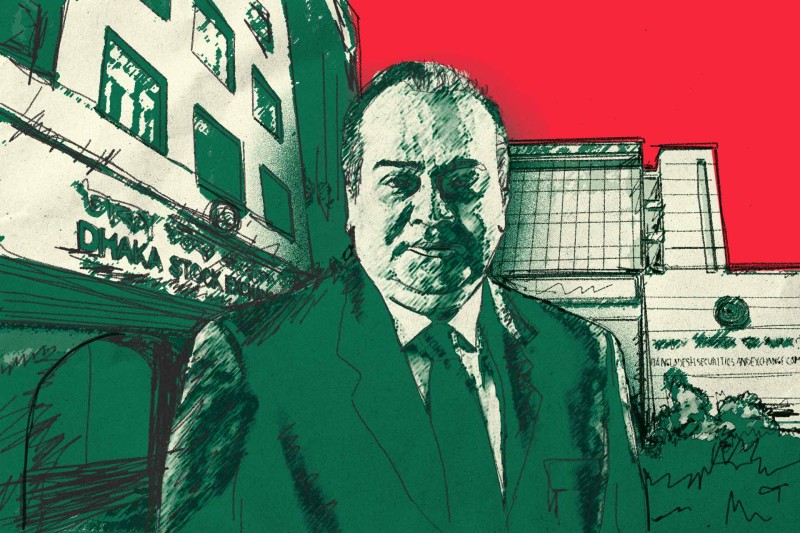In July 2021, Shibli Rubayat ul Islam, the chairman of Bangladesh’s capital markets regulator, took to a stage in Los Angeles. It was the first stop in his “The Rise of the Bengal Tiger” roadshow, which aimed to drum up enthusiasm for foreign investment into the country.
As the face of Bangladesh’s international sales pitch, Rubayat ul Islam touted the country’s growing economy and regulatory reforms under the leadership of Prime Minister Sheikh Hasina.
But behind the scenes, the picture was not so rosy. Just under two weeks earlier, Bangladesh’s anti-corruption authorities had received a complaint alleging that the regulatory chief had gotten payments from a bank account connected to a multi-million-dollar fraud.
At the heart of the accusations was a convicted scammer, Javeed Matin, whom Rubayat ul Islam had met at university and had been friends with for two decades. Throughout much of 2020, the complaint alleged, Matin helped launder the proceeds of a scheme that defrauded a Hong Kong-based supply chain and sourcing company, Ming Global Limited, out of more than $13 million.
Under the pretense of an investment, these funds were sent to two accounts held by a U.S. company, Monarch Holdings Inc., which then wired over $800,000 to Rubayat ul Islam’s personal account and to the accounts of a Bangladeshi company he appeared to be behind. (Current ownership details were unavailable.)
Through his lawyer, Rubayat ul Islam, who chairs the Bangladesh Securities and Exchange Commission (BSEC), told OCCRP he was not affiliated with the Bangladeshi company and that the transfers to his personal account were legitimate rent payments.
Ming Global filed a lawsuit against Monarch in the U.S. in 2020, but later shelved it, which the company’s director told OCCRP was because none of the defendants — or the money that was allegedly stolen — are in the country. The company also filed a suit to recover funds in Bangladesh from Rubayat ul Islam, who has filed a countersuit against them. The country’s Anti-Corruption Commission has taken no apparent action since it received the complaint against Rubayat ul Islam nearly two years ago.
“The legal system is one of the biggest disappointments of all this,” Ming Global’s director, Sarath Kumar Hegde, told OCCRP.
After the alleged scam took place, the BSEC approved Matin's Bangladeshi company, also called Monarch Holdings, to receive a stock-trading license, even though Matin had been convicted for a 2010 “pump-and-dump” tax fraud scheme in the U.S., which should have disqualified him under Bangladeshi law. (The chairman of the BSEC does not personally approve the licenses and OCCRP found no evidence Rubayat ul Islam influenced the process.)
Matin’s partner in the Bangladesh-registered Monarch was one of the country’s top cricket players, Shakib Al Hasan, who sometimes joined Rubayat ul Islam in his roadshow appearances. In a separate case, that company was reportedly fined for stock price manipulation last year.
The allegations against Rubayat ul Islam — which have not been made public until now — have had no apparent effect on his standing as chairman of the BSEC: He has continued his speaking appearances, and remained the public face of the country’s push for foreign investment.
Prime Minister Hasina, whose government has been accused of allowing corruption to run rampant, faces general elections next year. OCCRP’s previous reporting showed how one of Hasina’s top aides accrued over $4 million in New York real estate, without any apparent legitimate means of affording the properties.
“In general, financial regulators should take steps to avoid even the appearance of a conflict of interest,” Ross Delston, a Washington-based attorney who specializes in financial crime issues, told OCCRP.
“In cases involving long-standing friendship combined with financial dealings and allegations of fraud, a financial regulator should recuse themselves from any official dealings with friends and business associates and allow others in the regulatory body to make all such decisions, including those involving licensing.”
Matin, Al Hasan, the Anti-Corruption Commission, and Hasina’s office did not respond to requests for comment.
The Private Investigation
Matin’s Previous Fraud Conviction
Rubayat ul Islam met Matin, the convicted scammer, while they were both at the University of Dhaka. The two “established strong friendly relations,” which they maintained for two decades, according to a statement from Rubayat ul Islam’s suit in Bangladesh.
Over that time, Rubayat ul Islam worked in business before joining academia and becoming a prominent professor and researcher in banking and finance. He served in high-level positions at his alma mater before he was appointed head of the BSEC in May 2020.
Matin, meanwhile, went into business. After studying at the University of Mississippi, he set up multiple apparel companies in the U.S. during the early 2000s. In 2010, he ran afoul of U.S. stock regulators when he was accused of running a “pump-and-dump” scheme.
The scheme took place while Matin was serving as chief executive officer of Veltex Corporation, a Utah-registered apparel company purportedly operating in the U.S., Canada, and Bangladesh, according to the U.S. Securities and Exchange Commission (SEC) complaint.
Between 2004 and 2008, Matin moved millions of Veltex shares to a Colorado-based company, Wilshire Equity Inc., without registering them properly. He then “touted Veltex by issuing a series of false and misleading press releases grossly inflating Veltex's revenues, embellishing its overseas operations, and assuring investors that Veltex's financial statements were being audited,” the complaint said.
When Veltex’s share price jumped due to his own fraudulent claims, Matin netted about $6.5 million from shares sold through Wilshire Equity. The court ruled against Matin and his associates on two separate charges in 2011 and 2012, and they were ordered to pay a total of $13 million to the SEC and more than $100 million in damages to Veltex.
In 2015, Matin pled guilty to one count of bank fraud in a separate case, and agreed to forfeit over $170,000. He was sentenced to 27 months in prison, but was granted “supervised release” after a few months.
A decade later, Matin’s name would appear in connection with another alleged scam, which the Hong Kong-based Ming Global described as an “elaborate fraud based on non-existent investments” that “bilked” it out of more than $13 million.
Ming Global Says It Was Duped
The alleged fraud started in May 2020. In the testimony filed at U.S. court, Hegde, the Australian businessman serving as Ming Global’s director, said he received a cold call from people claiming to work for a well-known Hong Kong investment firm.
According to the testimony and copies of emails, a purported employee pitched Hegde investment opportunities and directed him to a company website, which had an apparently legitimate logo, contact information, and business address.
The next month, Ming Global sent $20,000 to two U.S. bank accounts provided by the employee, both held in the name of Monarch Holdings, which was registered in Nevada. Hegde’s contact told him the funds would be invested in two biotechnology companies and even gave him an online account to track the stocks.
Ming Global later paid over $2 million more, ostensibly to be invested in blue-chip stocks and “pre-IPO” shares in a private equity firm. In July, with the stocks apparently doing well, Hegde asked one of his contacts to retrieve his money. But he was told that to cash out, he would need to invest another $10 million. Ming Global obliged, paying the money to the same Monarch bank accounts.
Then his contact stopped responding.
Throughout July and August, Hegde was bounced between different contacts, who made excuses for the delays and asked for hundreds of thousands of dollars in new payments to unlock the funds.
By the end of August, Hegde wrote to one of the agents to say that “having no visibility or clarity is making lots of my investors nervous, including me.” The representatives responded with more excuses and delays.
Private Investigators Uncover Matin’s Involvement
Growing suspicious, Ming Global commissioned investigations into Monarch Holdings — the U.S. company into whose bank accounts it had paid the money — from the private consultancies Control Risks and IFW Global.
The private investigators found that scammers “well versed in financial crimes” appeared to have faked their association with the Hong Kong investment firm, and that employees at the real firm had never heard of them.
U.S. company records did not show who owned Monarch Holdings. But subpoenaed bank records showed that Matin had been added as a signatory to both of the Monarch accounts where Ming Global had sent money, one at U.S. Bank, and another at Bank of America. In one application, Matin was listed as the company’s “CFO.”
As millions of dollars from the alleged scam were moving into Monarch Holding’s U.S. accounts, money was also moving out through a series of over-the-counter withdrawals, wires, debit purchases, checks, and ATM withdrawals. Both accounts were closed shortly after.
A large chunk of the money from these accounts was sent to a Singaporean entity which the IFW Global investigation said was controlled by Matin’s associate. The remainder was sent to recipients in 14 other countries.
Over $800,000 had been sent directly from the U.S. bank accounts Matin controlled to accounts in Bangladesh — a trail which led to the BSEC head, Rubayat ul Islam.
BSEC Chief Receives Payments
Out of this amount, Rubayat ul Islam received about $278,000 into his personal account between late June and late July, 2020, bank records show. About $564,000 more was sent from Monarch’s accounts to an account held by a company called Xin Bangla Fabrics.
OCCRP was unable to obtain Xin Bangla’s current ownership information, because of difficulties with the company registry. But Rubayat ul Islam was listed in public documents as Xin Bangla’s contact person, including in a 2007 Swiss embassy newsletter about a Bangladeshi-Swiss business forum. He is also listed as the company’s managing director in an online registry of Bangladesh companies.
In its complaint to the anti-corruption commission, Ming Global said Xin Bangla was fully owned by the Rhine Group, a Bangladeshi company. Rhine Group’s registration documents, from 1991, show Rubayat ul Islam as a director and its largest shareholder. The company’s website is no longer available, but until at least 2015, it showed Rubayat ul Islam to be its general manager.
In an email exchange with IFW Global, shared with OCCRP, Rubayat ul Islam said Rhine Group had been closed more than a decade ago and that he had no ownership of Xin Bangla. He said the company was run by Ariful Islam, his elderly uncle.
Investigators also quoted a phone call with Ariful Islam, in which they said he told them that the company had no current business activities and that it was in fact owned and managed by his nephew. A transcript and recording of the call was shared with OCCRP, but Ariful Islam did not respond to requests for comment and the call was not possible to independently verify.
Xin Bangla’s bank records show limited activity after 2017, until a sudden influx of large amounts which appear to have come from Monarch’s accounts. The last withdrawal was made in late 2020 and the account was closed in May 2021.
As for the money sent into Rubayat ul Islam’s personal account, he said that Matin had paid the funds as “advanced rent and construction costs” for commercial space in an industrial building in a district of Dhaka. (It had been labeled in the Bank of America transfer as “family support.”)
The lease agreement, which Rubayat ul Islam submitted as part of his suit — and which bears only Matin’s signature — had a number of unusual elements.
First, it was agreed on the same day the last payment was made to Rubayat ul Islam’s personal account. Second, it was agreed between a California-registered company run by Matin called Matesta Apparel Inc., though the transfers had been sent from Monarch’s accounts. The last section of the contract also appears to incorrectly refer to the fifth and sixth floors of the building, rather than the fourth and fifth, as the rest of the contract says.
Though the site was supposed to be used for a garment factory starting on Jan. 1, 2021, with the lease lasting five years, a reporter who visited the site in January 2023 found that the floors were empty.
Rubayat ul Islam’s lawyer declined to comment in detail on questions about the lease because the suit in Bangladesh is still in progress. But he said that the allegations against his client were “absolutely misconceived and misconstrued and the outcome of a misunderstanding.”
“The whole issue is very plain and simple to the effect that my client received $277,924 into his bank account as advance rent, security deposit and advance construction costs under a lawful lease agreement executed by him and Matesta Apparel Inc., a US based conglomerate following all legal and tax processes,” he wrote in an email.
He said his client had been “left with no choice but to file a suit” after Ming Global failed to come up with “convincing and acceptable proof of ownership and entitlement of the amount.”
BSEC Approves Matin’s Company for Trading License
In May 2021, well after the alleged scam took place, the BSEC cleared the Bangladeshi version of Monarch Holdings to receive a stock trading license.
Even apart from the alleged scam involving Ming Global, Matin’s prior conviction for the pump-and-dump scheme should have disqualified him from receiving the license. BSEC rules prohibit issuing licenses to companies whose directors have been convicted for “any offense of moral turpitude” in any jurisdiction, without exceptions.
Thomson Reuters World-Check, a database for background checks that was required for each license applicant at that time, showed Matin’s earlier U.S. conviction. A Google search of Matin’s name also shows the original 2010 complaint against him.
Stock-Trading License Approval
The Bangladeshi Monarch has since become increasingly prominent, adding as a partner the cricketer Shakib Al Hasan. Al Hasan is a huge star in Bangladesh and current captain of the national team. He has also been the BSEC’s “brand ambassador” since 2020, and has accompanied Rubayat ul Islam on his international speaking tour.
In January 2021, a few months after Monarch Holdings was granted its license, the BSEC launched two advertisements featuring Al Hasan. The next month, just as IFW Global was contacting Rubayat ul Islam about his involvement with Matin, Al Hasan joined the regulatory chief on a roadshow stop in Dubai.
Matin's venture with Al Hasan has since expanded to Bangladesh’s second stock exchange, in the port city of Chittagong. The two have also started a new electronics business, also sharing the Monarch name.
The Bangladeshi Monarch has hit at least one spot of trouble, though. Last year, the company was reportedly fined 35.5 million Bangladeshi taka, worth roughly $300,000, for stock manipulation.







